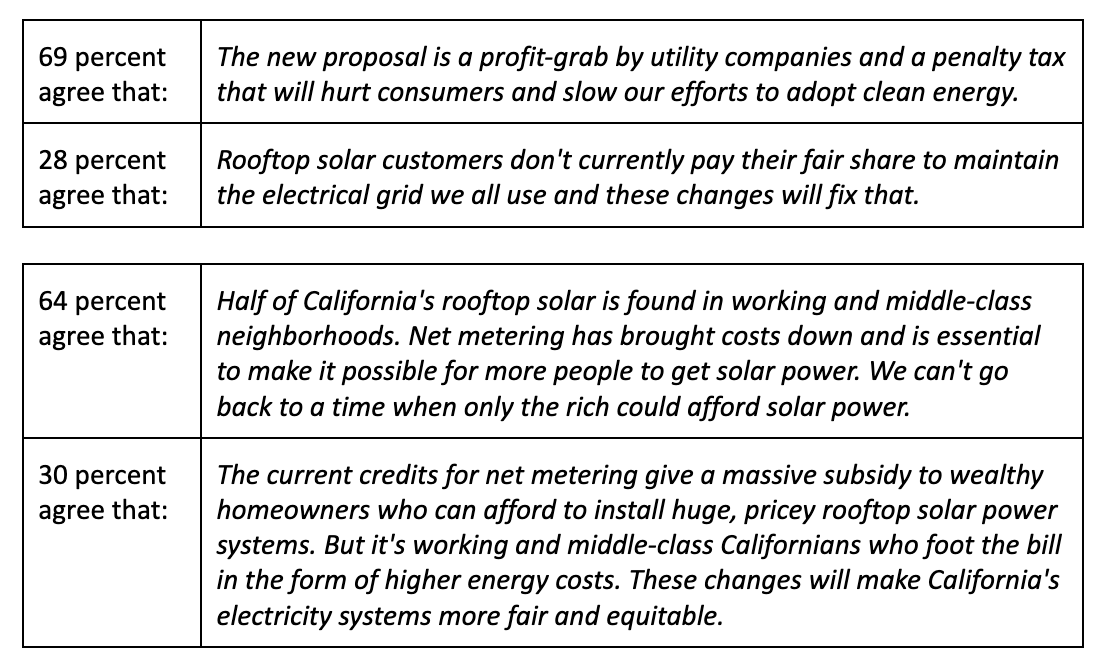“It is clear that any proposal including a tax on rooftop solar is going to be a non-starter with California voters.”
CALIFORNIA— A new poll released today shows the California Public Utilities Commission’s proposed decision on rooftop solar net metering is extremely unpopular with California voters.
Consistent with previous opinion research, rooftop solar is held in especially high esteem in the sunshine state. According to the poll, a supermajority—85 percent—of likely 2022 voters want California to do more, or about the same as it currently does, to encourage the use of solar power. Strong majority support for encouraging solar is found among Democrats, Independents, and Republicans.
When asked about net metering, the policy responsible for making solar affordable by crediting solar customers for the excess energy they produce and send back to the grid, 78 percent of voters express support. Not surprisingly then, nearly two thirds of voters—62 percent—oppose a proposal to “add a new fixed monthly fee on most people who install rooftop solar and reduce the credit” they receive for their extra energy.
“Governor Newsom recently said ‘there’s more work to be done’ on the CPUC’s proposal. While we really appreciate his acknowledgement, it might be the understatement of the year based on how toxic the proposal is,” said Bernadette Del Chiaro, Executive Director of the California Solar & Storage Association. “It is clear that any proposal including a tax on rooftop solar is going to be a non-starter with California voters.”
The poll was conducted as the California Public Utilities Commission gets ready to vote on a net metering proposal that solar advocates hope is a dramatic improvement from the initial proposed decision. The proposed decision released by the CPUC in December would implement a monthly penalty fee on solar consumers, adding up to nearly $700 a year, while slashing credits for solar consumers by 80 percent on average. The proposal is being met with intense opposition from environmentalists, conservationists, affordable housing advocates, civil rights leaders, along with solar consumers, workers and small businesses. An expected vote on the current proposed decision was recently delayed by the CPUC.
Voters predict a grim outlook for energy bills, solar growth, and fighting climate change if a change along the lines of the CPUC’s proposed decision is passed. A majority of voters believe the changes to net metering will increase their electric bill. 64 percent of property owners without solar currently would be less likely to consider solar installation with the proposed changes. 65 percent of property owners currently with solar said they would be less likely to install solar if they moved to a new home. Nearly half of voters surveyed said net metering changes will actually slow down California’s progress in combating climate change.
Despite an extended advertising campaign, voters are not buying the message from utility special interests that solar users are to blame for energy rate hikes. That reason is supported by just 11 percent of voters and the lowest of all options provided in the survey including the costs of building new electric transmission lines (15 percent), grid maintenance (33 percent), managing wildfire danger (41 percent), and utility companies seeking to maintain or boost their profits (51 percent).
“California voters are no fools. They love rooftop solar and they know utilities who try to convince them otherwise do not really have the interest of consumers, climate or clean energy in mind,” said Dave Rosenfeld, Executive Director of the Solar Rights Alliance. “Californians understand utilities have a profit motive in killing off solar compensation. And you cannot blame voters for their distrust of big utilities like PG&E which caused California’s second largest fire in state history and was found guilty of 84 felony counts of involuntary manslaughter, to say nothing of their continual bill increases.”
When provided both the perspectives of rooftop solar advocates and utility interests, most sided with solar:
The poll was conducted by Benenson Strategy Group and included 887 interviews with likely 2022 voters in California from January 15-19, 2022. Interviews were conducted using SMS text-to-web services, on landline phones, and with online panels. The sample was weighted to ensure it was proportionally representative of likely 2022 voters in California. The margin of sampling error is ±3.29% for the full sample at the 95% confidence level.

